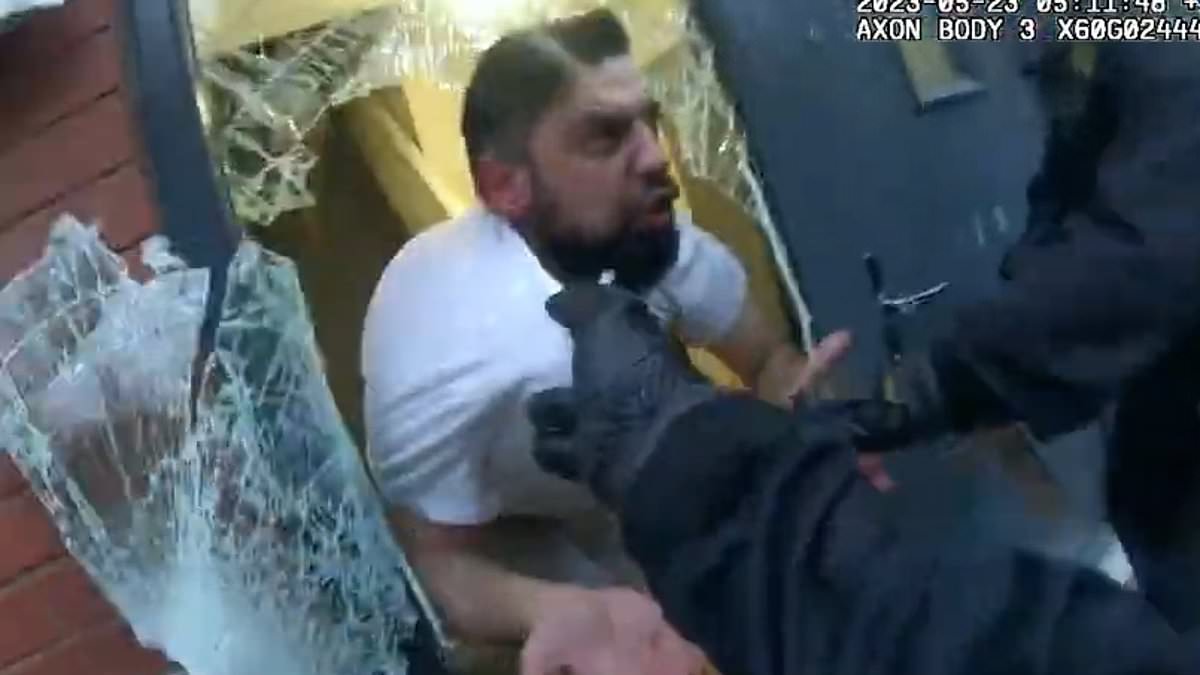Police have smashed one of Britain’s biggest county lines drugs gangs which made £1.2million a year.
A dozen gangsters have been handed sentences totalling more than 100 years for running the organised crime group, which sold vast amounts of deadly heroin and crack cocaine.
Dramatic footage shows the moment police burst into their homes in a series of dawn raids, with the once all-powerful kingpins seen bleary-eyed as they are pulled from their beds while still in their underwear.
Another thug is hauled through a broken window by officers as he moans, ‘What are you doing? What are you doing?’.
The major probe targeted four phone lines, codenamed Rico, Diego, Figo and Potter, that were used to sell drugs and collectively received more than 1,000 calls a day.
Phone analysis found they were sending bulk messages to large numbers of people advertising drugs for sale, which could then be ordered by ringing up the line specified in the text.
A total of 17 warrants were executed at properties across Birmingham and Solihull following a six-month investigation in the gang, who controlled a significant amount of the region’s drug supply.
Police discovered brothers Addam and Haroon Iqbal and Mohammed Usman were in control of the ‘Rico Line’ using two numbers operating in Hodge Hill, Birmingham.
Yesterday at Birmingham Crown Court, the gang were jailed for:
Aadam Iqbal, 28 – 12 years and six months
Anees Mahmood, 24 – 12 years and 10 months
Yasine Sadiq, 27 – 11 years
Ilyas Sadiq, 28 – 10 years and 10 months
Levy Mukwita, 25 – 10 years and six months
Mohammed Usman, 26 – 10 years and six months
Amani Adams, 21 – eight years
Haroon Iqbal, 34 – six years and four months
Adam Slater, 21 – sentenced to six years
Humair Ul Rehman, 27 – sentenced to six years
Tiahna Phillips, 23 – sentenced to five years
Mark Seeley, 36 – sentenced to four years and eight months
Further investigations by Britain’s second biggest police force uncovered Adam Slater and Tiahna Phillips both working for one of the other lines.
They were stopped in their car in Solihull last February and analysis of Slater’s phone identified it was being uses for the ‘Diego line’.
Later than month, Yasine Sadiq reactivated and switched the line to a different network in a bid to evade capture.
But telecommunication investigations and CCTV enquiries meant detectives were able to track the change and link Yasine to the ‘Diego line’.
Mark Seeley and Amani Adams were then linked to the ‘Figo line’, which was being controlled by a man called Ilyas Sadiq.
The three men would regularly exchange messages arranging meet ups and drug drop offs.
Seeley’s car was captured on CCTV a number of times parked outside shops where the ‘Diego line’ would be topped up.
Drug users would top the line up in exchange for extra drugs, which was another tactic often used by drug dealers to evade police.
Finally, Anees Mahmood, Humair Ul Rehman and Levy Mukwita were found working for the ‘Potter line’ and in regular communication with each other.
Messages revealed that Mukwita would supply drugs to all four lines and would act as the ‘middle man’ to each line.
The revenue from these lines were estimated to be between £18,000 and £20,000 per week – up to a staggering £100,000 per month.
It means the gang could have earned at least £1.8million during the one and a half year period in which they were known to be active.
A significant quantity of class A drugs, a large amount of cash and mobile phones used to run some of the lines were recovered during several raids.
Addam and Harroon Iqbal, Usman, Seeley, Yasine Sadiq, Ilyas Sadiq, Slater, Phillips and Mukwita were all arrested.
Amani Adams and Rehman handed themselves in the following month, while Mahmood was arrested at Birmingham Airport in September having fled to Pakistan.
Detective Sergeant Craig Tennant, from West Midlands Police, said: ‘This is a fantastic result following a complex investigation.
‘The team have successfully taken a large number of drugs off the streets and put this group who caused misery in our communities behind bars for a very long time.
‘The four lines operated under a unique model and they all worked together as a coalition, which is rare to see with a drugs line.
‘This meant they could service more customers and ultimately earn more money together.
‘Our actions do not stop at enforcement. We continue to work with partner agencies to offer support to vulnerable people and provide long-term support.
‘As ever, we couldn’t do this without information from the public and encourage you to get in touch if you have any information.
‘You might think it’s nothing, but it could be integral to our investigation.’
